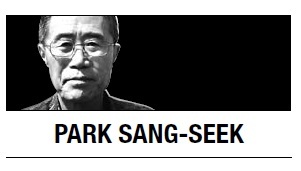
The relationship between South Korea and North Korea is unique in modern world history. The Korean people are perhaps the only ethnically homogeneous nation in the world living in two separate states in the same territorial sphere. Until the end of the cold war there were two more such peoples — the Germans and the Vietnamese, but the Vietnamese division was resolved by the joint action of the armed revolt of the South Vietnamese communists and North Vietnam, while the German division was ended by the collapse of Communist East Germany due to the collapse of the Soviet bloc.
The Korean people had maintained their ethnic homogeneity through one state until 1910 when Japan colonized Korea from the unification of the Korean Peninsula by the Silla Kingdom in 676. The Korean case is different from the German and Vietnamese cases in the sense that the communist forces in South Korea were never as strong as the South Vietnamese communists and the German states from the beginning agreed on a nonaggression pact and recognized each other as independent states with the full support of the four allied powers.
The Korean case is unique in another respect: North Korea invaded South Korea with the implicit support of its communist neighbors, while the U.S. decided to defend South Korea in fear of worldwide communist expansion. All these differences make the Korean security environment extremely complicated.
Initially, the South Korean government defined the North Korean invasion as a domestic rebellion (the 6.25 incident) because constitutionally the northern half of the Korean Peninsula is part of South Korea’s territory and the North Korean communist regime is illegal, but the participation of the U.S. and U.N. forces turned it into an international war (the Korean War).
Now, the South Korean and North Korean governments and peoples believe that the Koreans belong to one nation (the same ethnic group) and at the same time they recognize the Republic of Korea (South Korea) and the Democratic People’s Republic of Korea (North Korea) as their respective states. This dualist nature of the Korean states makes security on the Korean Peninsula extremely complicated.
States in the present world can be classified into single-nation states and plural-nation states according to the ethnic composition of states and single-religious states and plural religious states according to the religious or sectarian composition of states. Most European states belong to the first category; most African and Latin American states, the second; and most Arab states, the third and fourth. In Asia the four types of states coexist.
The two Koreas belong to an entirely new category of states. It is hardly imaginable that one ethnically homogeneous people living in two diametrically opposed political systems in the same territorial space can coexist peacefully. Under the circumstances, South Koreans suffer from a mental disorder — a dilemma between nationalism and patriotism. The South Korean and North Korean governments emphasize nationalism (uriminjokkiri) when they pursue a conciliatory strategy and patriotism (aeguksim) when they become hostile toward each other.
North Korea’s founder Kim Il-sung emphasized Korean nationalism; his son and successor Kim Jong-il, both; and current leader Kim Jung-un, patriotism. Scholars generally agree that nationalism and patriotism should be differentiated, although they admit that both complement each other. Nationalism is a primordial loyalty to ethnic identity in terms of race, culture and language, while patriotism refers to allegiance to one’s state or fatherland. Patriots are loyal to the state where they are born or where they earned citizenship. They also identify themselves with the political and legal systems of the country of which they become citizens.
For people whose nationality and state are identical, they are both nationalistic and patriotic and their nationalism and patriotism reinforce each other, but if a person’s nationality and state are different, he/she will experience a dilemma between nationalism and patriotism. In the case of Korea, both North Koreans and South Koreans suffer a dichotomy between nation and state. Whenever the North Korean regime becomes hostile and jingoistic toward the South Korean government, South Koreans become less nationalistic and more patriotic. In contrast, North Koreans have been so indoctrinated to become loyal to the existing communist state that they can no longer distinguish the nation from the state.
According to a Chosun Ilbo opinion survey conducted on the occasion of the 50th anniversary of independence last year, 66.2 percent of South Koreans surveyed in 2005 considered North Korea a cooperative partner, while only 43.5 percent in 2015 held the same opinion. This indicates that South Koreans have become more patriotic than nationalistic. Some extreme conservatives feel that North Korea is no longer part of Korea. If the division of Korea into two separate states continues for a long time, the Korean nation as a single homogeneous national unit may disappear.
The Korean nation has lasted for almost 1300 years. Now we can understand why South Koreans have become among the least patriotic-nationalistic peoples. According to a survey conducted in 1999-2001 by the Inter-University Consortium for Political and Social Research at the University of Michigan, South Korea ranked 45th out of 58 countries in answering the question of “How proud are you to be (substitute nationality) as the primary measure of patriotism?” Though it should be noted that China ranked 40th and Japan 49th.
It should also be noted that South Koreans’ willingness to fight in a war is very high, although their pride in being Korean is very low. This indicates that Koreans have a very strong desire not to lose their state and the South Koreans emphasize patriotism more than nationalism. As far as Korea is concerned, nationalism and patriotism do not complement each other: They countervail each other. It has become inevitable for the South Korean government to treat North Korea as a foreign state, not as a Korean state.
By Park Sang-seek
Park Sang-seek is a former rector of the Graduate Institute of Peace Studies, Kyung Hee University and the writer of “Globalized Korea and Localized Globe.” — Ed.

